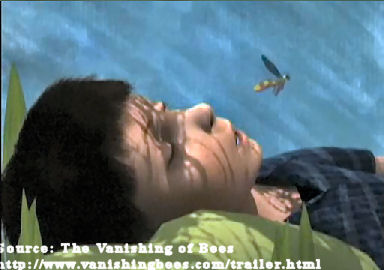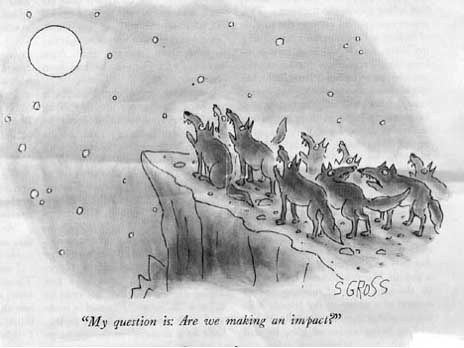The Vanishing of Bees - film

The Discovery of Honey, painting by Piero di Cosimo, taking the happy social connotations of honey to the mythical plane.
According to the film,  The Vanishing of Bees, there are 90 food crops dependent on bee pollination. If we lost bees, rice, corn, and wheat would continue to be available, but there would be little fruit or vegetables.
The Vanishing of Bees, there are 90 food crops dependent on bee pollination. If we lost bees, rice, corn, and wheat would continue to be available, but there would be little fruit or vegetables.
Bees most common insect pollinators
Here the film includes other insect pollinators as well as bees - such as flower wasps: "If we want a diet that is more than gruel, we need insect pollinators."
Emotionalism and Rationalism
In "Pollination and Reproductive Behavior of Crop Plants" by Dr. C Kameswara Rao of the Foundation for Biotechnology Awareness and Education, Bangalore, India, Dr Rao says, "Biotic pollen vectors such as honey bees and bumble bees and some others have an important role in sustainable agriculture, but that has been exaggerated, romanticized and emotionalized by expansive claims by the environmentalists."
But what are we humans, if not emotional, and what is life to us, if not an emotional experience? Without emotions there is no concentration and no learning. Without emotions there is no capacity to imagine what we might lose.
Garden of Eden

To highlight the shallowness of confining discussion to human survival prospects alone with a severely depleted and dumbed-down natural ecosystem, consider how it makes you feel to contemplate the myth of the Garden of Eden without the food trees and flowers and almost devoid of wild birds and animals - for all of the other creatures on earth depend on a natural environment which relies heavily on pollination. Agribusiness and genetic plant engineering aren't going to look after them. To the contrary!

Without the bee
Without the bee, it would be as if we had all been banished from the garden of Eden, a notion which gives pause.
Insecticides and Colony Collapse Disorder
See also "From Watchdog to Lapdog: An Insider's History of the EPA"
The name which has been given to the problem of bee colonies dying off is "Colony Collapse Disorder - CCD".
The blog associated with the film implicates pesticides in this awful problem, notably one from Bayer’s CropScience division, Clothiantin, with the trade name Poncho® among others.
The blog states:
"BAYER are the last remaining major global brand still producing and distributing this vile pesticide even though it is proven that farmers can Banned in Europe, this European company sell this primarily to the poorest countries in the world – including to many farmers in India where they dominate the pesticides market.
We believe that this is wrong and that BAYER should live up to their responsibilities and support a global ban rather than fight it. 14 years ago, they also pledged to remove some of the most toxic pesticides from the Indian market. And they still have not yet done that!"
Maryam Heinan writes,
"Bayer makes baby aspirins (which are supposedly bad for infants) and also gives headaches to bees.
Bayer has global sales of $45 billion and owns a subsidiary called Bayer CropScience AG that manufactures herbicides, fungicides, and insecticides as well as treated seeds. CropScience alone does $8.8 billion in global sales that is about 20% of Bayer’s business.
Poncho and Gaucho are some of the trade names that have caused strife to the bees.
The EPA in a fact sheet issued 5/31/2003 has described Bayer’s Clothiantin, one of who’s trade names is Poncho® a pesticide from Bayer’s CropScience division, as follows: “ Poncho® is highly toxic to honey bees on an acute contact basis (LD50 > 0.0439 µg/bee). It has the potential for toxic chronic exposure to honey bees, as well as other nontarget pollinators, through the translocation of Poncho® residues in nectar and pollen. In honeybees, the effects of this toxic chronic exposure may include lethal and/or sub-lethal effects in the larvae and reproductive effects in the queen.”
In May 2008 Germany banned the use of Poncho® when German beekeepers reported loosing over 50% of their hives after a Poncho® application was linked to the deaths of millions of bees in the Baden-Württemberg region. Bayer responded that the toxic effect was an isolated incident caused by an “extremely rare” application error. So Poncho® is banned in Germany where Bayer was founded in 1863 and has its global headquarters. After the “extremely rare” application error people started to link Poncho®with Colony Collapse Disorder (CCD).
So why does the EPA still allow the use of this insecticide in the US even though they described it in 2003 as “highly toxic to honeybees”? And why does the EPA still allow the use of this insecticide when its use has been banned in Germany where Bayer was founded 146 years ago, and has its global headquarters?
Because this country doesn’t adhere to the Precautionary Principle. In other countries when there is a slight risk they err on the side of caution. Not in America. Money and Greed rules."
See also :
"Trouble with bees", ABC Radio National's Background Briefing of 29 Jul 07, including transcript and link to 22Mb MP3 file.
A typically excellent documentary from the Background Briefing team. Much of it describes the insane US agricultural which is dependent, for pollination, on mobile bee colonies which are transported in trucks backwards and forwards across the US.




Recent comments